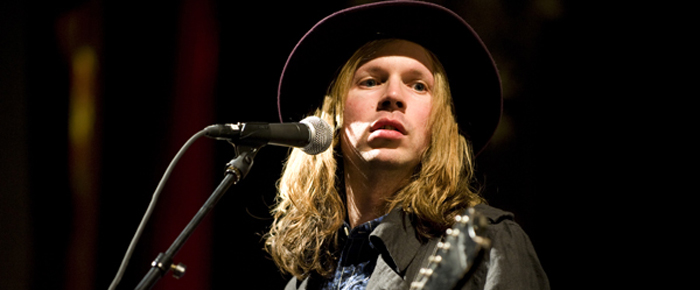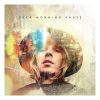
BY Eleni P. Austin
In the spring of 1994, Beck captured the music world’s attention with his first single, “Loser.” A smart-ass slacker hymn to the disenfranchised youth, it became an anthem for Generation X.
The melody had a super catchy, almost novelty quality, (not unlike Pharrell’s “Happy”) with the lyrics, a stream-of-conscious ramble that evoked comparisons to Bob Dylan’s “Subterranean Homesick Blues” and the Sugarhill Gang’s “Rapper’s Delight. But Beck was no one-hit-wonder.
Beck was born to Bibbe Hansen and David Campbell in 1970. His mother had been a Warhol Factory habitué in the late ‘60s. Her father, artist Al Hansen was briefly a part of the Fluxus Movement. David Campbell was a young arranger/composer/musician. (He has played on everything from Carole King’s Tapestry, to Black Sabbath’s 13).
Beck’s parents divorced when he was about 10. Influenced by Los Angeles’ diverse music scene, (everything from Latin to Hip Hop to X), he was motivated to play music. During his teen years, he fixated on Bluesmen like Leadbelly and Mississippi John Hurt. Then he discovered Woody Guthrie and Blind Willie Johnson.
Claiming he never felt safe in school, Beck quit during Junior High. He acquired a guitar at age 16 and began busking on city buses, mixing Delta Blues with his own embryonic compositions.
By 1989 he took the bus to New York City. He gravitated toward Manhattan’s Lower East Side. Motivated by slam poetry and performance art, he began improvising songs. He had found a place among like-minded musicians, but faced with the daunting prospect of another cold, NYC winter, he returned to L.A. and got a job in a video store, (“doing things like alphabetizing the pornography section”).
Beck woodshedded, played gigs at clubs in Silverlake and Hollywood. He began recording demos, which turned into homemade cassettes. He attracted the attention of Bong Load Custom Records. They hooked him up with real studio time and the result was “Loser.”
The song was almost a fluke, but radio stations took notice. “Loser” first popped up on the tiny college station, KXLU. Chris Douridas, of KCRW, played it on his taste-making show, “Morning Becomes Eclectic. He invited Beck to play live on the show and Beck performed “Loser,” along with “MTV Makes Me Want To Smoke Crack.”
Suddenly his shows were packed with record label reps ready to sign him. Beck ended up inking an unprecedented deal with Geffen that allowed him to continue to release one-off recordings through tiny indie labels like Flipside and K Records.
His major label debut, Mellow Gold arrived in March 1994. A primitive blend of Folk, Punk and Hip Hop, it climbed the Billboard Charts, peaking at #13. Rather than rest on his laurels, Beck immediately returned to the studio with the Dust Brothers, (the production team responsible for the Beastie Boys’ “Paul’s Boutique”).
The result, Odelay appeared in summer, 1996. A sonic collage that still sounds fresh today, the album produced three hit singles, “The Devil’s Haircut,” “Where It’s At” and “The New Pollution.” It remains Beck’s best-selling album.
As if to subvert expectations, Beck became something of a musical shapeshifter. Play his albums back-to-back, (go ahead, it’s a fun game!) and no two records sound the same.
1998’s Mutations was a heady brew of Folk and Tropicalia. The following year on Midnite Vultures, he seemed to be channeling Prince, Funkadelic, Zapp and Roger. (Plus his lyrics were wickedly funny).
In 2002, following a devastating break-up, Beck produced Sea Change. Somber, soporific and somewhat maudlin, the album stripped away Beck’s hipster cool, revealing real emotion.
Three years later, Beck re-emerged a husband and father, releasing Guero. Reuniting with the Dust Brothers, the album was a welcome return to his roots, mixing a kaleidoscope of L.A. influences. Two more albums followed, the meticulous The Information in 2006, and a deft collaboration with Danger Mouse in 2008 entitled Modern Guilt.
Although it’s been five years since Modern Guilt was released, Beck has kept busy with other projects. He has produced albums for artists as disparate as Charlotte Gainsbourg, Thurston Moore of Sonic Youth, Stephen Malkmus & The Jicks and Dwight Yoakam. He also created the Song Reader, a book that included 20 songs of sheet music and 100 pages of art.
Beck has finally released a new album, Morning Phase. It opens with a brief instrumental, “Cycle,” that feels like the musical equivalent of sunrise.
“Cycle” folds into “Morning.” Lush and ethereal, the song’s hushed multi-tracked harmonies recall the Beach Boys, Chicago’s “Wishing You Were Here” and even Seals & Crofts, (but in a good way). The lyrics hint at new beginnings…”this morning I lost all my defenses.”
Although the album is mostly upbeat, there is a lonely undercurrent that flows beneath the surface. This is especially true on two tracks, “Blue Moon” and “Unforgiven.”
Propelled by ukulele, charango and acoustic guitar, the jaunty melody of the former belies Beck’s downcast demeanor. Casting himself as “the turncoat on his knees, the vagabond no one sees.”
The latter locks into a mournful groove, accented by piano and harp. Here Beck is penitent, looking for absolution… “somewhere unforgiven, I will wait for you.”
Both “Heart Is A drum” and “Don’t Let It Go” echo the elegant 80s pop of Thomas Dolby. “Heart..” is a languid, lovelorn vision quest … “the heart is a drum, I need to find someone to show me how to play it slow/and just let go.”
“Don’t Let Go” is anchored by gentle acoustic guitar and sweet piano notes. The melody is a melancholy minor key masterpiece. Beck offers this philosophical nugget, “In the crossfire there’s a story, but how it ends we don’t know.”
The best songs here, “Say Goodbye,” “Blackbird Chain” “Turn Away” and “Country Down” evoke comparisons to Canyon cowboys like Neil Young and Jackson Browne, as well as Nick Drake. “Say Goodbye” blends prickly banjo riffs with high lonesome vocals.
The kid in “Loser” that urged us to “get crazy with the cheese whiz”now writes about “a symbol of your exegesis in a full length mirror” on “Blackbird Chain.” This jangly charmer offers up an oath of loyalty cloaked in doleful piano chords and graceful pedal steel.
“Turn Away” blends a tip-toe rhythms and see-saw guitar riffs with a light dusting of harp and dulcimer. Beck is tentative as he urges us to “betray the ache of change.”
Finally, “Country Down” is Beck at his most bucolic. Hammond B-3 fills intertwine with pedal steel and desolate harmonica notes.
The album closes with “Waking Light.” Flowing and spatial, the melody recalls the airy sonic explorations of Pink Floyd. Ripe with synthesizers, glockenspiel and clavinet, the song plays like an early 70s pocket symphony.
Morning Phase, may be just another color in Beck’s musical palette, but his most satisfying album to date.












































